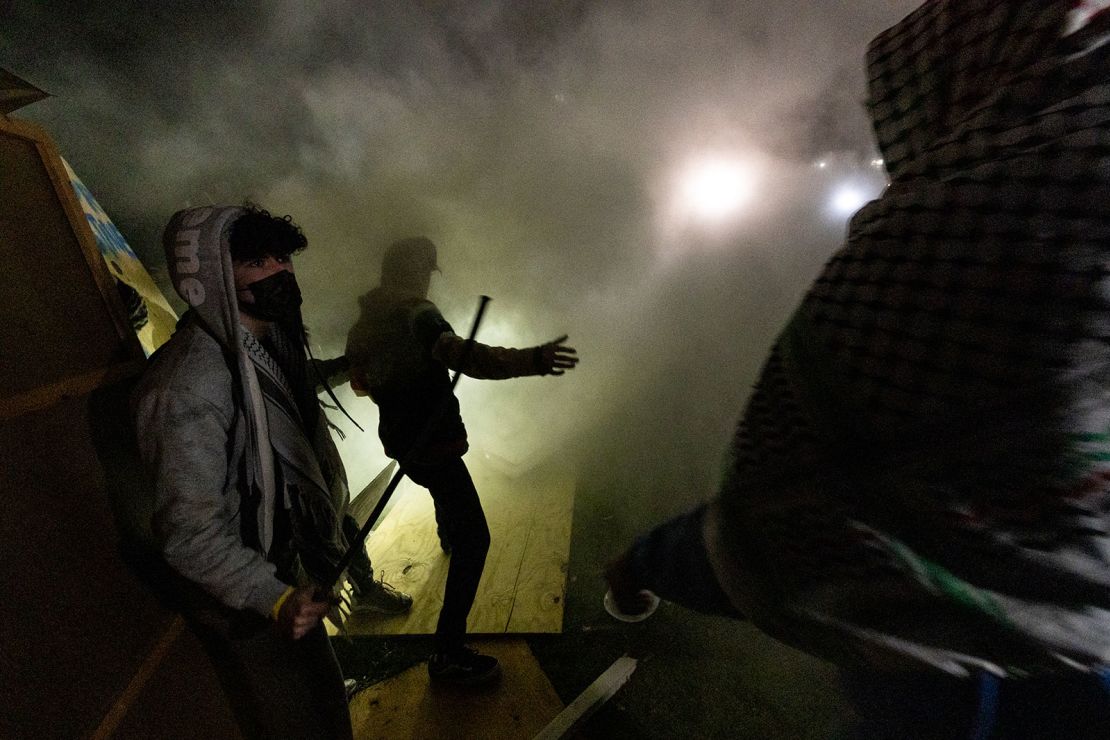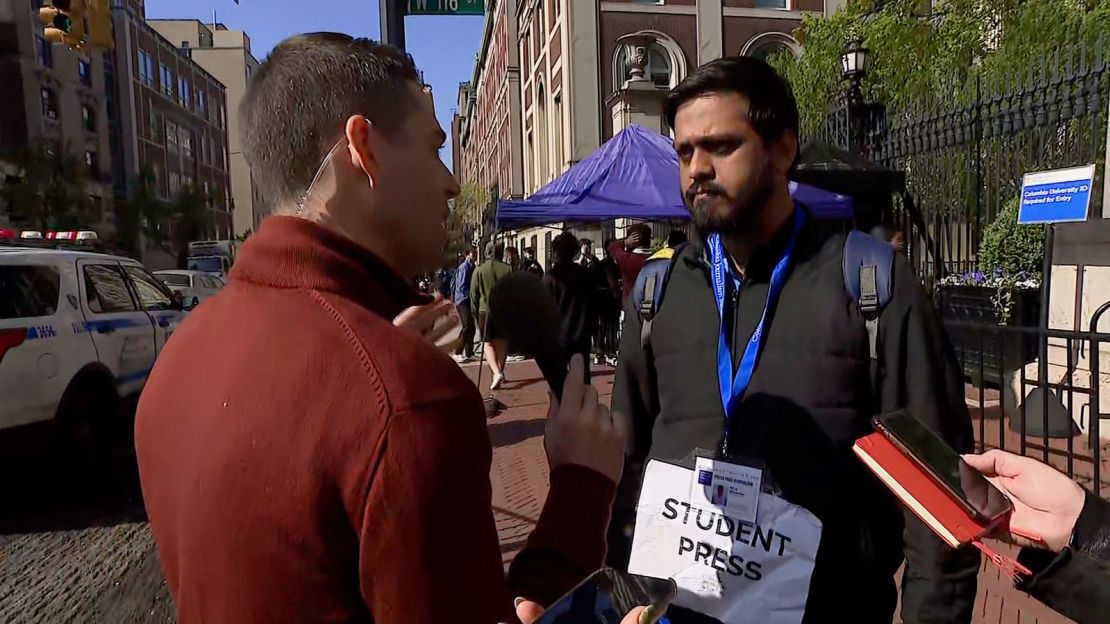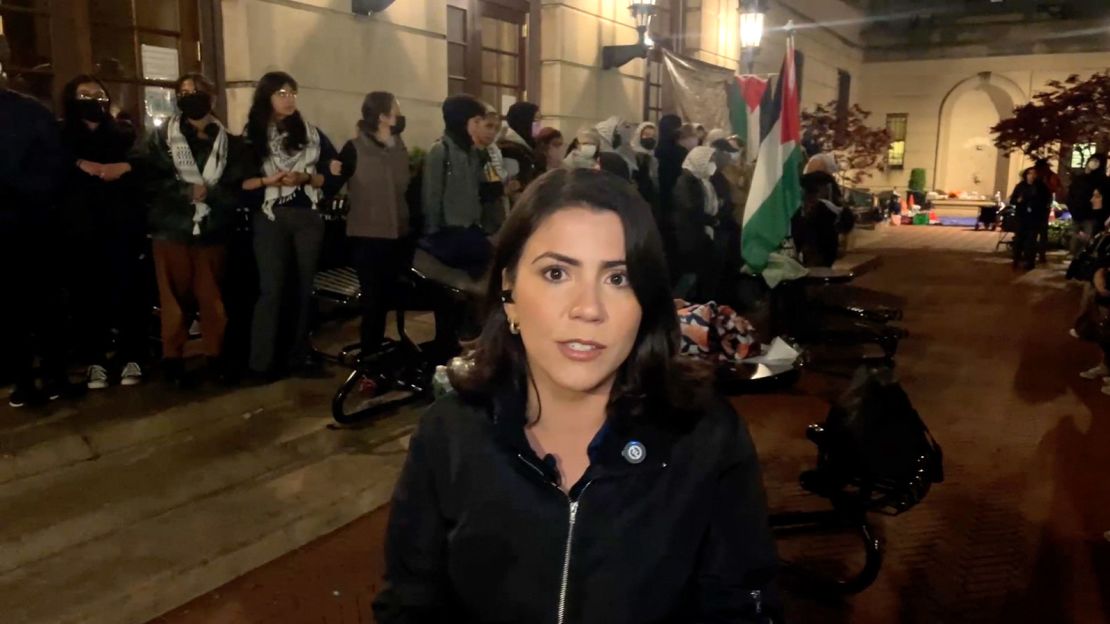Journalists tasked with covering violent unrest on college campuses across the US have been arrested and barred access as police moved in to crack down on pro-Palestinian protesters who have set up encampments and barricaded themselves inside buildings.
The confrontations with journalists come as student-run news outlets and traditional news media descend on college campuses where police officers have clashed with and arrested hundreds of demonstrators demanding the universities divest any financial ties with Israel over the war in Gaza. On one campus, assailants reportedly followed and attacked student journalists.
At Columbia University in New York, journalists said they were barred from covering the unrest Tuesday night as police officers in riot gear breached an academic building where demonstrators were barricaded, resulting in more than 100 arrests. At the University of California, Los Angeles, student journalists reporting on violent clashes between protesters said they were assaulted and gassed. And in Northern California, local journalists covering college demonstrations were detained and arrested by police.
On some college campuses rocked by the demonstrations,?access?has been?restricted to students only,?effectively making student?journalists the only?reliable?news?media reporting on the campus protests and clashes.
At?UCLA,?reporters for the student-run newspaper The Daily Bruin, said they were violently attacked during the clashes Tuesday night, including being followed, slapped and sprayed with irritants, the newspaper said. Student Editor Anna Dai-Liu told CNN that she was gassed, and other student reporters were assaulted, with one reporter being taken to emergency care.
“Shortly before 3:30 a.m., four Daily Bruin reporters were walking on campus when they were followed and then assaulted,” the newspaper reported. “Five to six assailants also sprayed reporters with an irritant. As some reporters went to help a reporter that was pulled to the ground, assailants began to record on their cellphones.”

The newspaper did not?state?who assaulted the?student journalists,?but the violence came as counter protesters, some of whom were pro-Israel, clashed with the pro-Palestinian?demonstrators?on the campus.
In the immediate wake of the violence,?the Daily Bruin?posted a?scathing?editorial?on its website?blasting?the school’s leadership and declaring, “UCLA is complicit in violence inflicted upon protesters.”
“Daily Bruin reporters on the scene were slapped and indirectly sprayed with irritants. Despite also being students, they were offered no protection,” the editorial said.
The?university?later announced it was canceling?all?classes on Wednesday “due to the distress caused by the violence that took place,”?overnight.
Working journalist arrested
Hundreds of miles away at California State Polytechnic University,?Humboldt, three journalists were detained while covering campus protests, according to a?local public radio outlet, including a television news reporter who was?arrested while filming the demonstrations.
In video footage posted online, Adelmi Ruiz, a reporter for ABC affiliate KRCR, who was seen?wearing a press badge and a jacket bearing the station logo,?was summoned by an officer?behind a line of?police?holding shields.
“We need you out of the way,” an?officer was?heard saying.
But shortly after, officers?were?heard telling Ruiz to put her phone away and her hands behind her back.?An officer was heard saying she had been told to leave “an active crime scene.”?
“They didn’t care that I was a reporter,?just as long as you’re on campus they’re able to detain you,” Ruiz later told a colleague in an interview.
Ruiz said her hands were zip tied, she was?placed?in a police vehicle, and taken to the Humboldt?County jail?where her mugshot was taken. The sheriff later apologized to her and she was released, she said.
Student journalists step up
Meanwhile, at Columbia University,?dramatic scenes played out?Tuesday night?as police?officers in riot gear moved to?clear Hamilton Hall, an?academic building that?had been?commandeered?by?pro-Palestinian protesters. But there was little media presence.
Access was heavily restricted on the campus?after authorities blocked?journalists?from entering the area, which Associated Press reporter Jake Offenhartz?called?“one of the most frustrating nights for press access I’ve experienced as a reporter.”

Meghnad Bose, a graduate student at?Columbia Journalism School, told CNN’s Gabe Cohen that with most?student reporters pushed out of the vicinity of Hamilton Hall they couldn’t bear witness to what happened.
“The footage that we have from last night is very sparse, and that footage already raises some troubling questions about the NYPD’s conduct on the campus,” Bose said. “If we had more journalists, more student journalists there we would have known much better what actually unfolded.”
CNN?reporter?Julia Vargas Jones, a?graduate?student at the journalism school,?reported from the scene for the network, capturing police breaching the building and arresting several demonstrators amid a chaotic scene.
Without a production crew, Vargas Jones said she recruited fellow students to help her?broadcast live on CNN, including journalism student?Corinne Catibayan who has worked as a television reporter in the?Philippines.
“[Police] came in and just very clinically pushed everyone to one side. As far as they were concerned there was no press there,?they were just expecting to see students,” Vargas Jones said. “The officers didn’t know we were live on CNN.”
Although Vargas Jones was also eventually pushed off campus, she credited the Columbia Journalism?School for championing student reporters.

“The school was helping student journalists gain access to campus and allowing them to use the journalism school facilities 24-7,” she said, noting that she slept?overnight?in an edit bay at the school, alongside Catibayan.
“It’s not quite in line with what the rest of the administration is doing,” Vargas Jones said.
Public?interest in the clashes on college campuses has been so high that?some student-run news outlets?have had trouble?staying online amid a surge in audience traffic.
Columbia University’s radio station WKCR reported overnight it was experiencing “intermittent outages due to an excess of connections” after?providing live coverage of the arrests on campus.?The school newspaper, The Columbia Spectator, was also difficult to access on Wednesday afternoon.
UCLA’s Daily Bruin?website?was also inaccessible at times,?sending would-be readers to an error page that said the site could not be viewed.
Vargas Jones,?who has been a professional journalist for 10 years,?said that despite the challenge of covering the activity on campus, the?flashpoint has provided student journalists with much-needed reporting experience and critical transparency for the public.
“Student journalists have a unique and essential role on their campuses in observing and disseminating news,” said Gary Green, executive director of the Student Press Law Center. “It is precisely in times of crisis like these when such coverage is needed the most and student journalists are at their best.”
Green said the group that offers legal representation to high school and college news outlets is disturbed by the reports of student journalists under threat and assault on campuses. He urged school officials and law enforcement to ensure student journalists can report safely and accurately on the historic events.
“Now is the time to strengthen our commitment to the student press, not sideline or undermine it,” he said.
Jelani Cobb, dean of the Columbia Journalism School, also applauded student journalists for their reporting on the campus protests.
“It was truly inspiring to see our faculty and our students, shoulder to shoulder, covering a national news story that emerged on our doorstep,” Cobb said in a message to students Wednesday. “Your perseverance during a confusing and challenging moment cannot be understated. You told the stories the global public deserved to hear.”





